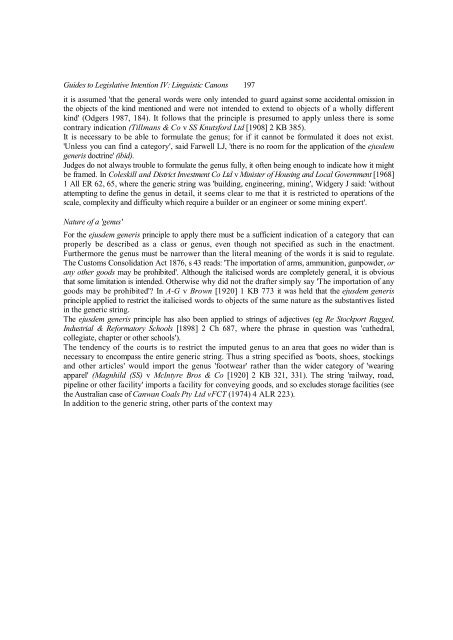Statutory Interpretation The Technique of Statutory ... - Francis Bennion
Statutory Interpretation The Technique of Statutory ... - Francis Bennion
Statutory Interpretation The Technique of Statutory ... - Francis Bennion
Create successful ePaper yourself
Turn your PDF publications into a flip-book with our unique Google optimized e-Paper software.
Guides to Legislative Intention IV: Linguistic Canons 197<br />
it is assumed 'that the general words were only intended to guard against some accidental omission in<br />
the objects <strong>of</strong> the kind mentioned and were not intended to extend to objects <strong>of</strong> a wholly different<br />
kind' (Odgers 1987, 184). It follows that the principle is presumed to apply unless there is some<br />
contrary indication (Tillmans & Co v SS Knutsford Ltd [1908] 2 KB 385).<br />
It is necessary to be able to formulate the genus; for if it cannot be formulated it does not exist.<br />
'Unless you can find a category', said Farwell LJ, 'there is no room for the application <strong>of</strong> the ejusdem<br />
generis doctrine' (ibid).<br />
Judges do not always trouble to formulate the genus fully, it <strong>of</strong>ten being enough to indicate how it might<br />
be framed. In Coleskill and District Investment Co Ltd v Minister <strong>of</strong> Housing and Local Government [1968]<br />
1 All ER 62, 65, where the generic string was 'building, engineering, mining', Widgery J said: 'without<br />
attempting to define the genus in detail, it seems clear to me that it is restricted to operations <strong>of</strong> the<br />
scale, complexity and difficulty which require a builder or an engineer or some mining expert'.<br />
Nature <strong>of</strong> a 'genus'<br />
For the ejusdem generis principle to apply there must be a sufficient indication <strong>of</strong> a category that can<br />
properly be described as a class or genus, even though not specified as such in the enactment.<br />
Furthermore the genus must be narrower than the literal meaning <strong>of</strong> the words it is said to regulate.<br />
<strong>The</strong> Customs Consolidation Act 1876, s 43 reads: '<strong>The</strong> importation <strong>of</strong> arms, ammunition, gunpowder, or<br />
any other goods may be prohibited'. Although the italicised words are completely general, it is obvious<br />
that some limitation is intended. Otherwise why did not the drafter simply say '<strong>The</strong> importation <strong>of</strong> any<br />
goods may be prohibited'? In A-G v Brown [1920] 1 KB 773 it was held that the ejusdem generis<br />
principle applied to restrict the italicised words to objects <strong>of</strong> the same nature as the substantives listed<br />
in the generic string.<br />
<strong>The</strong> ejusdem generis principle has also been applied to strings <strong>of</strong> adjectives (eg Re Stockport Ragged,<br />
Industrial & Reformatory Schools [1898] 2 Ch 687, where the phrase in question was 'cathedral,<br />
collegiate, chapter or other schools').<br />
<strong>The</strong> tendency <strong>of</strong> the courts is to restrict the imputed genus to an area that goes no wider than is<br />
necessary to encompass the entire generic string. Thus a string specified as 'boots, shoes, stockings<br />
and other articles' would import the genus 'footwear' rather than the wider category <strong>of</strong> 'wearing<br />
apparel' (Magnhild (SS) v Mclntyre Bros & Co [1920] 2 KB 321, 331). <strong>The</strong> string 'railway, road,<br />
pipeline or other facility' imports a facility for conveying goods, and so excludes storage facilities (see<br />
the Australian case <strong>of</strong> Canwan Coals Pty Ltd vFCT (1974) 4 ALR 223).<br />
In addition to the generic string, other parts <strong>of</strong> the context may

















